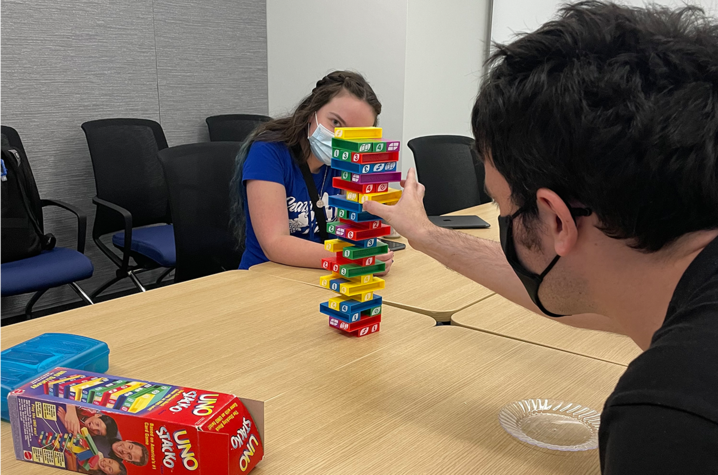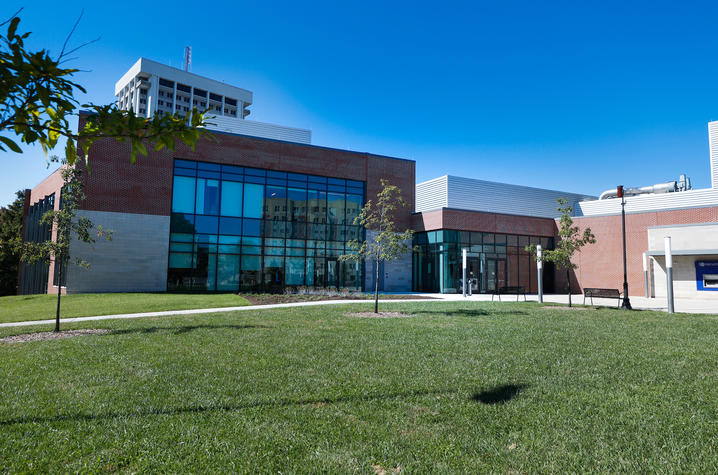UK student defies the odds with the help from Disability Resource Center
March is Developmental Disabilities Awareness Month (DDAM). To recognize this awareness month, UKNow is highlighting Casey and his involvement with the UK Disability Resource Center and their Neurodiverse Educational Social Initiative (NESI) program. To learn more about how the University of Kentucky supports those with disabilities year-round, continue reading below.
LEXINGTON, Ky. (March 28, 2024) — When Casey was diagnosed with autism at the age of 3, doctors told his parents they would be lucky if he ever attended college. Now pursuing his Ph.D., Casey is on a mission to challenge people’s assumptions of what autistic people can or can’t do.
Growing up in Massachusetts, Casey says he’s always had a bit of a chip on his shoulder. He always felt like he had to prove himself. The typical journey for students with an autism diagnosis means lower expectations. Casey and his family resented that notion. Thanks to supportive parents, his grit and determination, and a passion for STEM, Casey eventually landed at the University of Kentucky. Defying all odds, it was here that he was not only able to break through the limits placed on him educationally but also socially.
“I’m fortunate to have a family that has supported everything that I have done so far,” Casey said. “They’ve advocated for me before I could do so myself, and their support helped me realize that I don’t have to let my disability hold me back. That even though I have to work harder to get there, I can still be whatever I want myself to become.”
At UK, every student belongs. From the moment they become a Wildcat, through graduation and beyond, the university is committed to supporting students. For students like Casey, additional support is provided by the Disability Resource Center (DRC).
Housed in the Office for Student Success, the DRC partners with qualified students with disabilities to assist them in gaining equal access to institutional programs and services consistent with their unique needs. The center seeks to responsibly advocate the needs of students with disabilities to the campus community through consultation and outreach efforts with administration, faculty, students and university partners. Serving more than 3,500 a year, the DRC plays a crucial role in creating belonging on campus.
Casey first got involved with the DRC when he came to UK in 2019.
“I had really bad test anxiety during my early years at UK,” Casey said. “After I was diagnosed with a generalized anxiety disorder by the counseling center, I went to the DRC to obtain accommodations. They were extremely helpful during the first couple years in my program, but thankfully I am at a point in my program where I no longer need them.”
While Casey was able to manage his testing anxiety with the help of the DRC, he felt like there was still something missing — a community to see himself in. Then he heard about a program offered through the DRC called NESI.
The Neurodiverse Educational Social Initiative (NESI) was designed to supplement existing services offered across UK specifically in creating a sense of belonging and educational opportunities for neurodivergent students, including members of the autism spectrum and students with social anxiety. Staff-led and student-directed, NESI meets on a weekly basis for students to meet and participate in activities such as dinners, board games or tabletop role playing games. Included in these meetings are discussions of social topics and life skills. Students are also referred to other resources at UK that partner with NESI to work with neurodiverse students.
“We realized we were spending a significant amount of time supporting autistic students in crisis across campus and that this was tied to lacking a sense of belonging on campus,” John Caldora, disability accommodations consultant, said. “As UK was in a big push for increasing student belonging at that time, we thought this would complement nicely to fill that gap for our autistic and socially anxious students.”
Part of the reason Caldora founded NESI was based on his own experiences as an undergraduate.
“When I was tested for autism in second grade, like Casey, my parents were told that I’d never attend college," he said. "Finding my niche in undergrad was a challenge. Autistic educators have been moving into higher education and autism support programs to give our current and future students a better experience than we had.”
High school students with autism are attending college in greater numbers, thanks to new academic and emotional support services designed specifically for them. The traditional path for more than 66% of students with autism was to not attend college within the first two years of graduating from high school, according to research published in the journal Research in Developmental Disabilities. Other research found that only about 41% of students with disabilities, including autism, graduate with a bachelor’s degree. Today that number is rising as there are over 125 support programs offered for neurodivergent students, mostly at four-year colleges, according to the College Autism Network.
“Developmental disabilities, like autism, ADHD and learning disabilities are often invisible, yet individuals with these disabilities are here,” Caldora said. “They make up a significant percentage of our students, faculty and staff. Community awareness in supporting them is essential for creating equal access to the UK experience.”
Caldora believes the more we can do to make the world universally accessible, the less we will need accommodations. For students like Casey, that rings true.
“There are times when I feel that I am the only autistic person on campus, even though I know that this is not true,” Casey said. “These thoughts can make me feel very lonely, and I think that loneliness is amplified by the fact that I am a grad student. I think that having an environment like NESI where I can hang out with other neurodivergent people reminds me that I am not the only one like me here at UK. Other grad students as well as staff have attended both now and in the past. It is also reassuring to know that there are people like me that I can call friends and peers.”
Every March, the National Association of Councils on Developmental Disabilities (NACDD) and its partners collaborate to lead Developmental Disabilities Awareness Month (DDAM). The annual campaign highlights how people with and without disabilities come together to form strong communities. This year’s theme, “A World of Opportunities,” focuses on the goal of removing obstacles to community living faced by people with intellectual or developmental disabilities.
Stories like Casey’s are important to tell in March especially, and beyond, and remind us that finding belonging and community is not one size fits all. While some people excel in new environments and charging into the unknown, others need a little more assistance.
The DRC is not the only place advocating for students like Casey on campus. The UK Human Development Institute (HDI) works to advance efforts that build inclusive communities, address inequities and improve the lives of all people who experience disability across their lifespan. Established in 1969, HDI, under the Office of the Vice President for Research, is part of a nationwide network of University Centers for Excellence.
NESI partners with HDI’s College and Career Studies program to provide programming opportunities for neurodivergent students attending the certificate program for students with intellectual disabilities. According to Caldora, “At NESI, we want to reduce as many barriers to access as possible, our attendees come from all over UK, from the CCS program to Ph.D. students like Casey, to faculty and staff. We don’t require a formal diagnosis to attend NESI.”
HDI was awarded a five-year Leadership Education in Neurodevelopmental Disabilities (LEND) grant from the Health Resources and Services Administration (HRSA) Maternal and Child Health Bureau in partnership with the University of Louisville and Eastern Kentucky University. The LEND programs share the same overall mission of improving the health of infants, children and adolescents with, or at risk for, neurodevelopmental and related disabilities including autism. A major focus of LEND is to increase the number of professionals with the knowledge and skills to provide evidence-based screening and diagnosis as well as support to individuals and families.
The HDI LEND Training Program is now accepting applications for the 2024-2025 academic year. A total of nine trainees representing graduate students, people with disabilities and family members of people with disabilities will be accepted. Trainees will engage in community and class experiences, thoughtful discussions with interdisciplinary leaders in healthcare and leadership opportunities. Applicants may apply online for admission by April 1, 2024. Learn more about LEND at https://hdi.uky.edu/kylend and apply online here: https://uky.az1.qualtrics.com/jfe/form/SV_5vAMf2dLWxdaRV4
As DDAM comes to a close, Caldora encourages a continued push for support for neurodivergent students. He not only encourages students to get involved with the DRC but also encourages faculty to reach out to the Center for Engagement in Teaching and Learning (CELT) for more information on how to implement universal design for learning in their classroom.
Caldora regularly trains staff and faculty across campus on how to support neurodivergent students with skills that enhance all of our student’s success and well-being. To schedule a consultation to assist in answering specific questions regarding recommended accommodations, student issues, alternative text for class materials, creating an inclusive classroom environment for students with disabilities and how to incorporate principles of universal design into the educational experience, contact the DRC at drc@uky.edu or 859-257-2754.
NESI meets Mondays at 3:30 p.m. in the Gatton Student Center East Wing through April 22. Students, faculty and staff are welcome.
This program is supported by the Health Resources and Services Administration (HRSA) of the U.S. Department of Health and Human Services (HHS) as part of an award totaling $2,273,238 with 0% financed with non-governmental sources. The contents are those of the author(s) and do not necessarily represent the official views of, nor an endorsement, by HRSA, HHS, or the U.S. Government. For more information, please visit HRSA.gov.
At the University of Kentucky, students are at the center of all that we do. From the moment you become a Wildcat through graduation and beyond, the Office for Student Success is committed to supporting you. Comprised of more than 40 units, the office is united by one vision — to help students live a life of meaning and purpose. Student Success designs and delivers unparalleled services and supports a community of learners in achieving their wildest ambitions. In the Office for Student Success, this is what we do — this is who we are. Explore Student Success resources.






